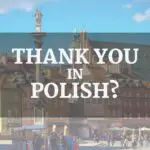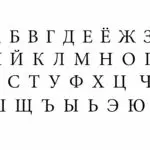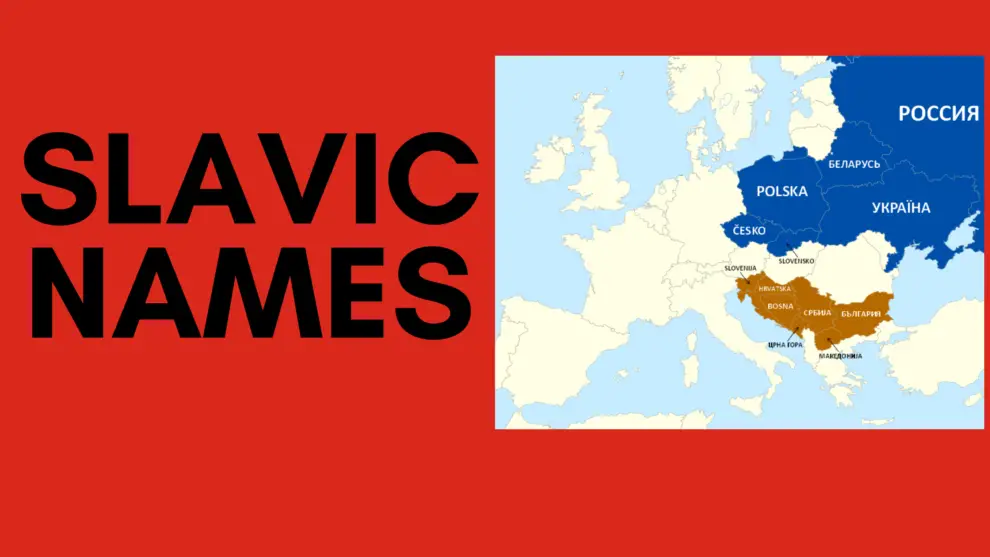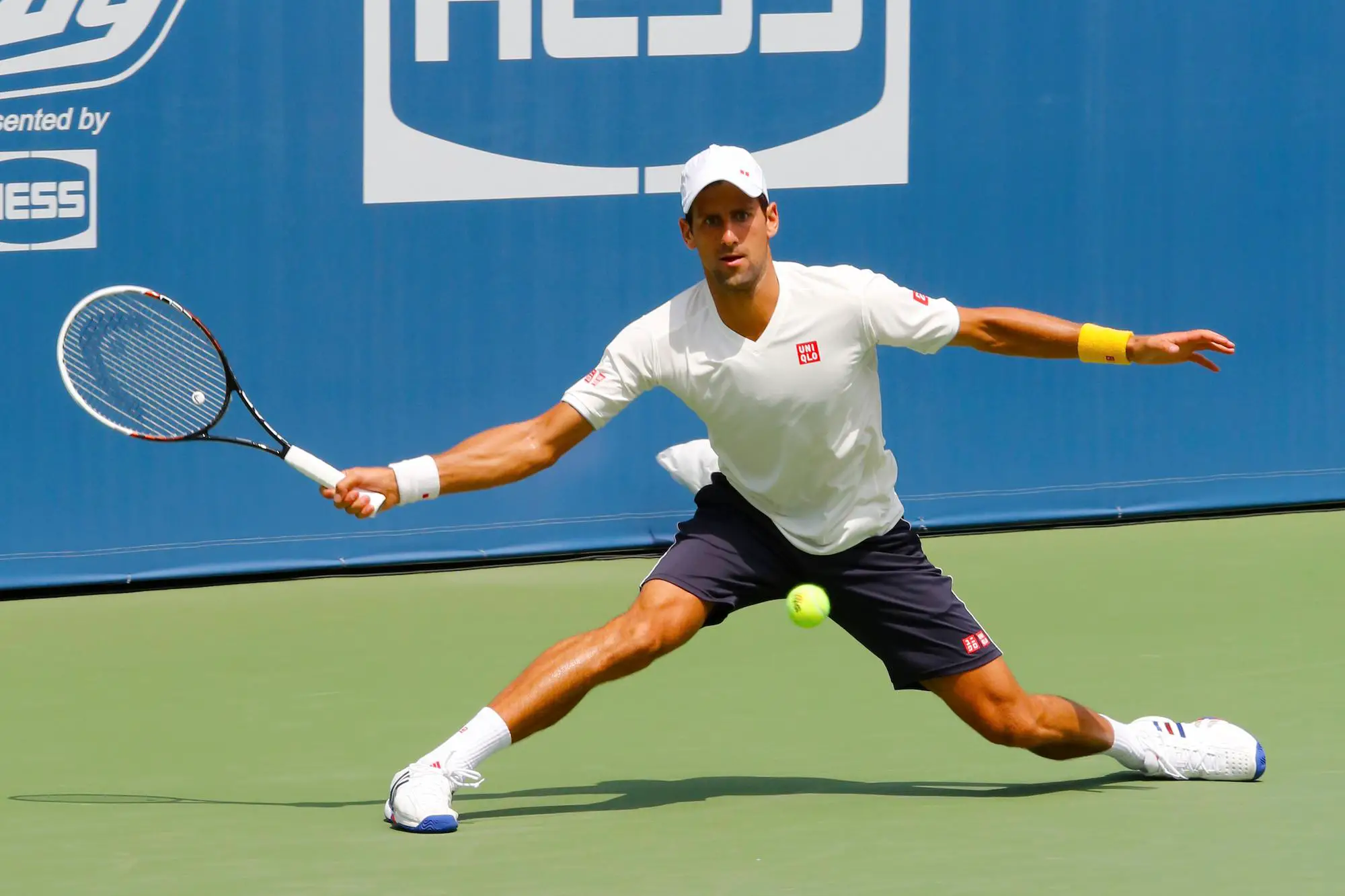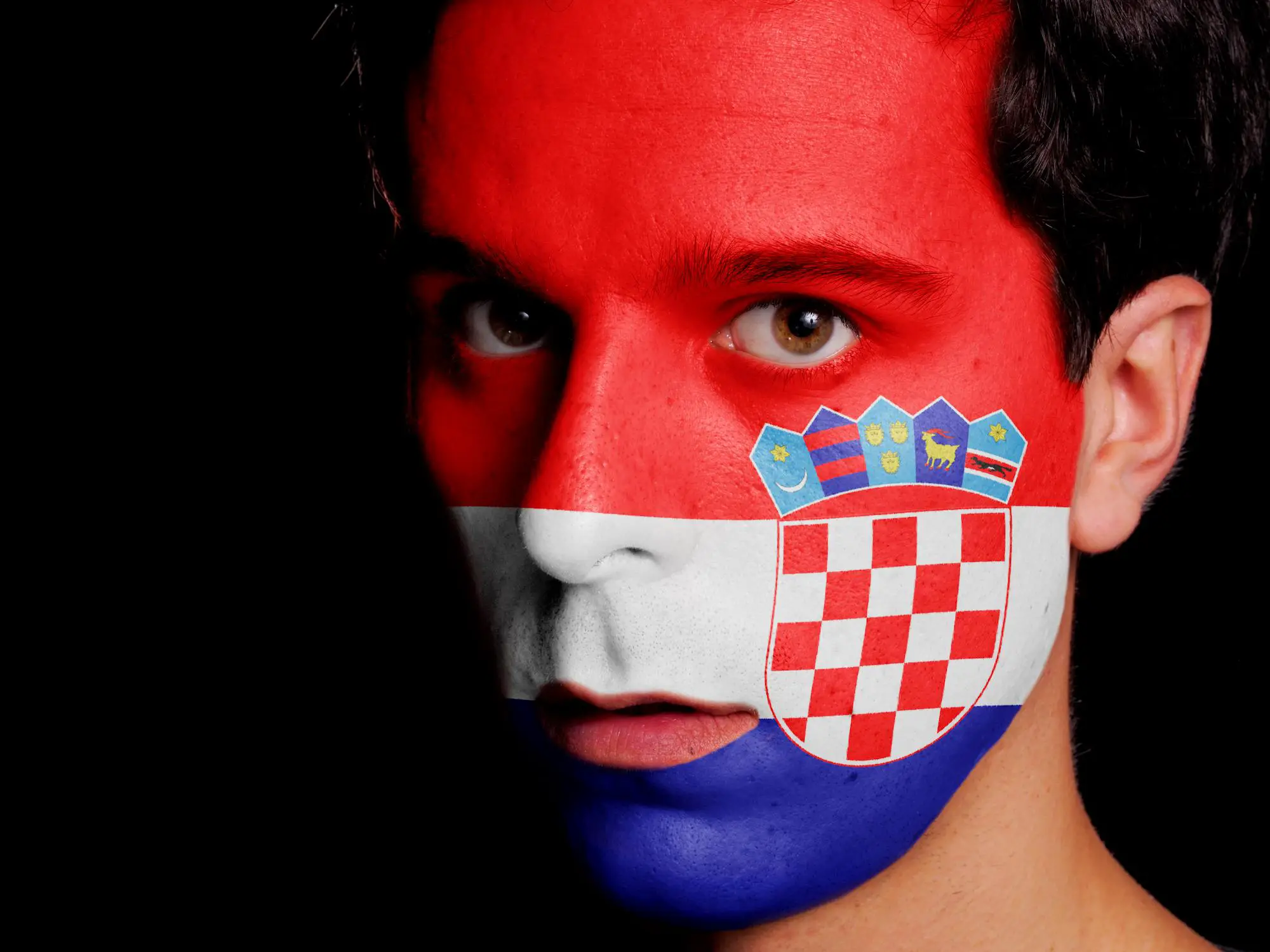Every culture has its names. They do not occur by accident. The main values in a society, determine the nomenclature of its members. By getting to know the etymology of the most popular names inside of a group, we always get to know more about the group itself.
In the following article, we introduce you to a list of Slavic names, accompanied by their etymology which is deeply rooted in the old Slavic esperanto.
Further down in the article, we also have a video for you if you want to hear the pronunciations.
Table of Contents
Slavic Names
Eastern Slavic Names (Russia and Ukraine)
Andrey (Andrea)
Andrey, Andrei or Andrej is a Slavic form of Andrew, a name of two meanings, and originating from the Greek language. It is either made of the old Greek word Andreois meaning manly and masculine or made of Aner meaning man. The first interpretation is valid in a wider sense since, among the Slavic girls, the feminine Andrea is quite often in use. In 2013, the deadly tropical storm in Florida was given the same name.
It is also a commonly given baby name today, especially in the Balkans, Russia and Ukraine.
This name has many popular namesakes, Andrei Tarkovsky and Andriy Shevchenko to begin with. Andrew, the Duke of York, is also one of them, followed by the popular actor Andrew Garfield and two prodigal tennis players Andy Murray and Andre Agassi.
Boleslav (Boleslava)
Boleslaw, Bolesław, Boleslav or the short variant Bolko is a typical Slavic name, common among the boys of Eastern, Western and Southern Slavs. Etymologically it dissolves to Bole – meaning better, larger or greater and Slav – denoting that Boleslav is a member of the Slavs.
In a free interpretation, this name means “a better Slav, better than the other Slavs”.
Although many interpret Slav as glory (which translates Slava in most Slavic languages), we find this option less probable, because in most of the cases it just doesn’t make any sense.
The feminine modality is also very frequent among the Slavic girl names, especially between the girls in Poland and the Czech Republic. In the north of Czechia, there is a stationary city named Mlada Boleslav (named after King Boleslav II) which is a major Bohemian industrial centre and a home of one of the top European car manufacturers Škoda Auto.
Boris (Borislava)
A typical name of pure Slavic origin, common in all Slavic sub-groups. It derives from the verb Bori which means to fight. It is reasonable to think that the s at the end of the name indicates it is a short version of Borislav, which is also very common among the older generations.
As for the girls, the name Borislava and Borka exist, but those are not a top choice among the baby names.
It is best interpreted as ‘a fighter, a fighter between the Slavs’.
There are many famous people with this name, for example, the British prime-minister Boris Johnson, the ex-Soviet president Boris Yeltsin, the top chess player of Russian origin Boris Spassky and the former German tennis number one Boris Becker.
Bohumil (Bohumila)
It comes from the old Slavic word Bog meaning god, and Myl meaning dear. It means “someone that is dear to God”.
Few of the most famous namesakes include Bohumil Kubista, the Czech writer Bohumil Hrabal and the sculptor Bohumil Kafka. The feminine variant Bogomila is one of the most frequent female Slavic names among the elderly on the Balkan peninsula.
The presence of this name in the Balkans is related to the Christian neo-Gnostic or dualistic sect named Bogomilism. It started from a priest named Bohymyl, that lived on what is today a North Macedonian territory, and spread very fast all the way to France (Cathars)
These teachings were based upon the idea that ‘your body is a temple’ and resisted any form of institutional control, coming both from the State or the Church. They didn’t use the cross as the main symbol, and although Christian, didn’t build any churches or monasteries.
Main focus of the Bogomils was the fasting tradition, proclaiming many new ways of cleansing the soul.
Bazhan (Bazhana)
This name also has the word Bog (a god) as an etymological core. Between the Southern Slavs, there is a version of this name written Bozhan, which means “one that belongs to god”.
Kazimir (Casimira)
There is a popular interpretation (rooted in the old Polish tradition) where Kazimir means “the destroyer of peace”. Although probable, we find another interpretation much more likely.
The word Kazi is of an old Slavic origin, a short modality of the verb Kazati which has two meanings: to say and to preach. Mir, as in several other names Slavic, stands for the noun peace. Therefore, in opposition to the mainstream interpretation, Kazimir means “someone who is preaching peace.” It has more frequent use between the Eastern Slavs.
In quantum field theory, the Casimir effect and the Casimir–Polder force are physical forces arising from a quantized field. They are named after the Dutch physicist Hendrik Casimir [1].
Among the name lists of artistic giants, you will unmistakably see the name Kazimir because of Kazimir Malevich. It is a top avant-garde Russian painter and art theorist, which pioneer works give an initial lead for the development of the abstract art of the 20th century.
Other popular namesakes are Casimir Pulaski, Casimir Lewy, Casimiro de Abreu, the Australian movie actor Kazimir Sas, the French poet Casimir Delavigne and the fictional character of the French TV show “l’Île aux enfants” named Casimir the Dinosaur.
Miroslav (Miroslava)
As we have previously seen, Mir is a Slavic noun that stands for peace. If we take Slav as a mark showing the tribal belonging, it can be translated as “a peaceful Slav”. If we consider Slav to mean glory it means “a peaceful glory, someone who takes the glory in a peaceful way”. In any case, it is a name that bears a powerful symbolism.
That is the reason it is very frequent (especially among the girl names) among the Slavic baby names. As a baby name, it is often used in its short form Mira or Mimi, which is also adorable. It can be interpreted as a Slavic form of the Hebrew name Myriam too. Myriam means “a wished-for child” and in the Bible has a prophetic connotation.
Some famous namesakes are the Yugoslavian literary giant of Croatian origin Miroslav Krleža, and the German football all-time best scorer Miroslav Klose.
Mstyslav (Mstyslava)
Msty, one of the two words contained in this name, is an old Slavic word which means vengeance. Combined with the suffix Slav, it means “the Slav that revenges himself”.
Two famous people with this name are the Patriarch Mstyslav of Ukrainian Orthodox Church and the popular Ukrainian human rights activist, photographer, and journalist Mstyslav Chernov.
Rostislav (Rostislava)
A common name between the Eastern Slavs, especially the ruling class in the past, as can be understood from the examples of Rostislav I of Kiev, Rostislav of Tmutarakan, Rostislav Mikhailovich.
As it is quite difficult to mention some notable contemporary namesakes, it is fair to conclude that it is not a very popular baby name among the Slavic baby names.
Its etymological core is the verb Raste which means to grow and therefore Rostislav means “the one who grows, the growing Slav.”
It is also frequent among the older Slavs living in Europe, especially in Poland, Slovakia, Slovenia, and the Czech Republic. In those four countries we mentioned, there are special days in the year when this particular name is celebrated. In Czechia, it is the 19th of April, in Slovenia on the 10th of March, in Slovakia it is January the 13th while in Poland it is January the 17th.
Svyatopolk (Svyata)
One of the ancient Slavic names, common among the Eastern Slavs (especially Ukraine) but also Poland. Svyat means holy and Polk means army. Svyatopolk is someone “who commands with a holy or a god-blessed army”.
In the Balkans, the male form is not very frequently heard, although the feminine variant is well spread among the Slavic girl names. Svyata or Sveta was a regular among the Slavic baby names in the 20s and the 30s, before the reign of the Communist party.
In the search of some popular Svyatopolk namesakes, we found Svyatoslav Podgaevskiy, Svyatoslav Fyodorov, and the Ukraine musician Svyatoslav Vakarchuk.
Vlad (Vladislava)
It is an authentic Slavic name that derives from the verb Vlada, meaning to rule. It is the most basic form of many variations, with Vladimir being the most popular. It is also the name of the Russian President, Vladimir Putin.
Vsevolod is also common among the Russian boy names. It is a bipartite consisted of Vse meaning all and Vlada (with volod being an Easter Slavic variant). It is interpreted as “the one who rules with everything” and is very common among the Eastern Slavs.
Another name in relation to Vlad is Vadym. A typical Ukraine name, with an unclear name meaning. One theory says that it derives also from the word Vlada, or Russian Volod (to rule) but there are other theories that claim it comes from Vaditi which means to blame.
It is quite possible that it originates from a non-Slavic language as well.
Yaroslav (Yaroslava)
Also found as Jaroslav or Jarosław. It is an ancient Slavic name with a root in Yaro, which is associated with a Proto-Slavic deity of the sun, spring, and fertility.
The word Raz-jaren, in North Macedonia for example, stands for heavily aroused, both in a positive or a negative way. Slav, as usual, stands to denote its tribal membership. In a free interpretation, the name means “the aroused Slav, the one that is lively, energetic, up-beat”
Historically speaking, this name is best known among the Slavs for Yaroslav the Wise, a grand prince of Kiev and Novgorod who laid the base principles of the law code called Russkaya Pravda [2].
In terms of toponymy, it is known as the name of a Russian city (Yaroslavl) that played a major role in the overall Russian history. Among the context of the contemporary, worldwide it is best known in its feminine variant for the high-jumper Yaroslava Mahuchikh.
Yaromyr is another very common male name among the Slavs. Its etymology remains unclear, and somewhat paradoxical, because Yaro (or Jaro) is a Proto-Slavic deity of the sun. This deity, although seen as a positive force, is a pure opposite of Myr as we already explained.
If you are interested in reading more about popular last names, take a look at this article about Eastern European Last Names.
Slavic Names on the Balkan Peninsula (Southern Slavs)
Bojan (Bojana)
This name, and its female variant Bojana, are among the most frequent Balkan names. In the old Slavic mythology Bojan is a pagan god that calls the warriors in a battle by singing, and this interpretation is especially common among the Russian citizens.
In addition, two other interpretations are possible, both based upon the Slavic word Boj. It means both a battle as a noun, and to be afraid when used as a verb. Therefore, Bojan can mean “a warrior” but also “an afraid one, one who fears”
Some also believe that it is of Avarian origin, with the name meaning “someone wealthy, rich”.
Branko (Branka)
It is a typical Slavic name for a baby boy, most popular among the Southern Slavs. It got its origin from the verb Brani which means to defend someone of something.
One of many famous people named Branko in the Balkans is the renowned Serbian 20th-century poet Branko Miljković.
Cvetko (Cveta)
An easy one in terms of interpretation, as it is a pure name of Slavic origin, and it originates directly from the Slavic word Cvet which means a flower in English. It is not very popular among Slavic baby names nowadays.
It is more frequent among the older generations, especially its feminine modality which is very common among the old Slavic female names.
Dejan (Dejana)
A very old Slavic name with several possible meanings. Some believe that it comes from Dejati which is a Slavic verb meaning to do things, to be active. Others explain it through the lens of the Roman origins and go back, through Dei back to Deus meaning god or goddess.
A famous Dejan that comes to mind is the legendary Serbian footballer Dejan Stankovic.
Davor (Davorka)
It is believed to derive from the pagan Slavic mythology, before Christ. Davor is believed to be the god of war, with seven heads and eight swords. It is also possible this name originates from the word Davori, a Slavic exclamation, expressing wonder, joy, excitement, or even sorrow.
This name is most common in Croatia, but one can find it also in Poland and Germany. One of the most popular people with this name is the Serbian Olympic Wrestling Champion, Davor Stefanek.
Gorjan (Gorjana)
A typical name of Slavic origin, more common in its male variant, although in the last decade Gorjana also raised in popularity between the Slavic girl names.
The base of this name is the word Gora, a Slavic term for a forest. Therefore, Goran means “a man of the forest”. Some of the most famous namesakes are Goran Bregovic, the Croatian pop-singer Goran Karan and the most famous North Macedonian footballer Goran Pandev.
Jugoslav (Jugoslava)
Very top choice in terms of Slavic boy names (and Slavic girls names too) during the existence of the former Socialist Federal Republic of Yugoslavia. It means “a southern Slav”, but in the context of the Balkan cultures, it is tied to associations of the past.
Milan (Mila)
One of the most famous names among the Balkan boy names and Balkan girl names. It has the core Mil (or as written among the Eastern Slavs Myl) which stands for dear. So, the feminine variant has exactly the same form as the original word, while the male option has the suffix -an.
This name is most famous for the Czech writer Milan Kundera, but also the American actress Milla Jovovic, the Serbian frontmen Milan Mladenovic and the Croatian footballer Milan Badelj.
Novak
A common name for a baby boy in the Balkans today, and also an ancient one between the Slavic male names, first noted in the 14th century.
The core of the name is the work Nov meaning new. This name is given with a wish “everything to start a new” for the family where the baby has been born.
It became very famous and popular, especially among the Serbs, with the recent success of Novak Djokovic, one of the all-time best tennis players coming from Serbia.
Srđan
A medieval version of the name was Srdan. It comes with its Serbo-Croat roots, where the verb Srditi means being angry, furious, or aroused, but is mostly understood as someone who is highly energized and lively.
It is common between the Serbs, Montenegrins, Croats, and in North Macedonia, as the popular namesakes are Srđan Šaper (founder of I&F McCann Grupa and the cult band Idoli), the Serbian actor Srđan Todorovic and the Macedonian diplomat Srđan Kerim.
Vedran (Vedrana)
Vedran is one of the most popular Slavic baby names in Croatia and North Macedonia, due to its universal positive meaning. Its origin derives from the word Vedro: a clear sky, good weather but also a good mood in terms of one’s feelings.
The female variant Vedrana is somewhat less common, with Vedra also being an option among the Slavic girl names in the past. Most popular namesakes are two Croats, the journalist Vedrana Rudan and the Croat author Vedran Bađun.
Zvezdan (Zvezda, Zvezdana)
Coming from Zvezda, which translates to a star. As you can notice, the female version has the same form as the term this name originates. The most popular Balkan football club, especially while Yugoslavia existed, was named Crvena Zvezda (Red Star, nowadays Red Star Belgrade).
Although very poetic and with beautiful symbolism behind, its popularity is not at its peak when it comes to Slavic first names today. Some famous people with this name are the actors Zvezdan Terzic, Zvezdana Mlakar, and the Macedonian writer and journalist Zvezdan Georgievski.
Related articles
Slavs: History & Origins of the Slavic People
Are Bulgarians Slavs, Tatars or Something Else?
Western Slavic Names (Poland, Slovakia and the Czech Republic)
Bronisław (Bronisława)
Similar to Branko or Branislav, Bronisław has the verb Brani which means to defend. Common among the boys of Slavic background and fairly popular among the Slavic baby names in general.
Worldwide, this name is known for Bronisław Kaminski (a politician, anti-communist activist) and Bronisław Malinovsky – one of the most famous anthropologists of all time.
Czesław (Czesława)
Its top popularity among the Czechs is due to its meaning. It literally means “a Slav from Czechia”. It is famous worldwide because of its namesakes Czesław Niemen, Czesława Kwoka, and the American author of Polish origin Czesław Milosz.
Godzimir (Godzimira)
An old Slavic name, typical for the Western Slavs. The name’s meanings are related to Godzi meaning “to do something at the right time” and Mir a term we already met during those explanations, meaning peace. It is common among the older generations.
Lech
Frequent name, especially in Poland, where it has a patriotic connotation. The legend says that all Western Slavs developed from three brothers named Lech, Czech, and Rus. Lech, between the people living in the Czech Republic, denotes someone from Poland.
The most famous Lech, after one of the legends, is the famous revolutionary politician named Lech Wałęsa. Its popularity was at its peak among the Slavic baby names during the time his politics had a major influence.
Sławoj
Although some think of it as a new name, it has quite a tradition among the names Slavic. As a mainstream interpretation, this name is made of the terms Slawa meaning glory and Woj meaning battle.
What is also possible is that it originates from Slavuj, which stands for the common nightingale bird in most of the Slavic languages. The most famous namesake today is the worldwide recognized philosopher from Slovenia, Slavoj Žižek.
Sulisław (Sulisława)
A Polish version of Boleslaw, “a better Slav”, or as the mainstream interpretation finds “a better glory”. It is common among Poles, both as male and female Slavic name.
Wacław (Wacława)
Common among Poles and Czechs. In general, its origin comes from Vyacheslav, but simplified due to easier pronunciation for the non-Slavic tribes. Therefore, it is a kind of exonym, a Latin version of the previously mentioned name.
The most famous people with this name are the Polish mathematician Wacław Sierpinsky, Wacław Kowalski, and the musician Wacław Zimpel.
Wojciech
Another top choice among the Slavic baby names. Its origin is quite clear, following the name lists explaining the etymology of names frequent among the Western Slavs. With Woj meaning battle, and Ciech meaning joy, this name is usually interpreted as “one that enjoys on the battlefield.”
There are many famous people with this name, with the Italian football club Juventus goalkeeper Wojciech Szczesny first coming to mind. And he is not the last known Wojciech by any means. Some other very notable ones are Wojciech Fangor, Wojciech Mann, Wojciech Cejrowski, and the famous composer for movies, Wojciech Kilar.
Zdzisław (Zdzisława)
This name is common for the Western Slavs. The first compound of the two meanings, the word Zdzi means to do, to act with somewhat wider interpretation towards to build, to develop. The second term is Slav. Consequently, it means “the Slav who acts, who builds and develops”.
The most famous Zdzisław of them all is the prodigal Polish painter Zdzisław Beksiński.




